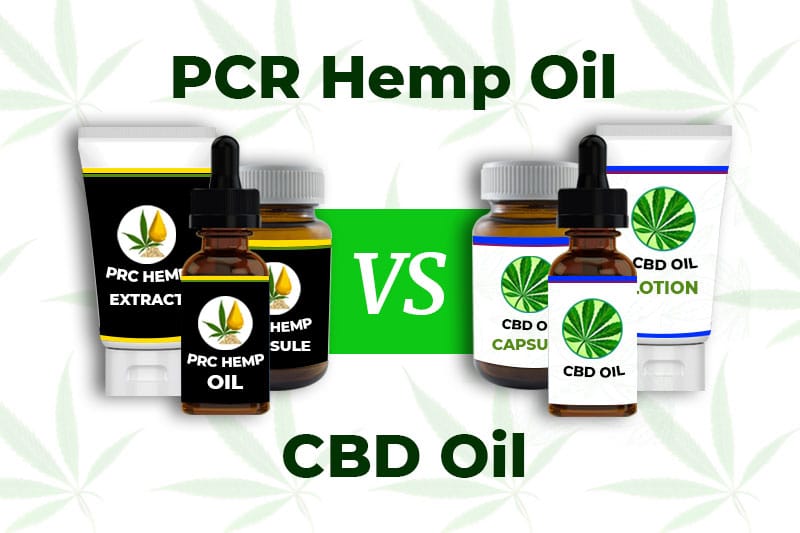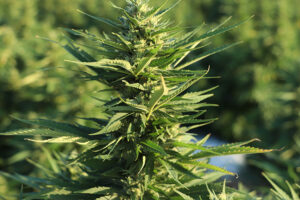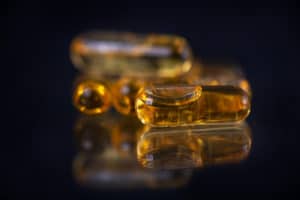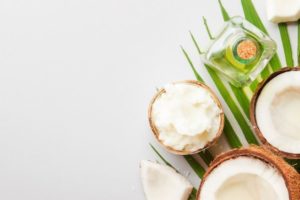If you have been closely following the cannabinoid industry-related news, you might have noticed that there is a new buzzword: PCR hemp oil.
It seems that every month there is a new craze, and it can be difficult to keep up with all the latest jargon, but this trend isn’t going to be fading anytime soon.
The universal opinion is that PCR hemp oil is a superior product to regular CBD oil, and needs to be a priority when shopping for CBD-related products. Yet, it is quite difficult to understand these claims without understanding the product itself and how it differs from available products in the market.
We have prepared a guide to help you understand what PCR hemp oil is, its applications and benefits, and how it differs from traditional CBD oil.
If you would like to know more about PCR hemp oil, this guide is for you.
What is PCR Hemp Oil?
PCR stands for phytocannabinoid-rich hemp oil.
What does that mean? The regular CBD oil production process focuses on a single cannabinoid, CBD, or cannabidiol. PCR hemp oil utilizes a full-spectrum approach to cannabinoid extraction, making the final program a more natural and holistic type of remedy.
Cannabidiol is only one out of 113 known cannabinoids found in hemp. There are hundreds of other substances and compounds in the plant that are also absent in the regular CBD oil. A PCR hemp oil label requires the product to undergo a special extraction process that will preserve all the naturally occurring cannabinoids in the plant, as well as all other substances, such as terpenes and flavonoids.
Like regular CBD oil, PCR hemp oil does NOT contain THC or produce a “high.”
The whole idea behind a PCR hemp oil is that by preserving all the natural cannabinoids and other compounds, the oil becomes a true full-spectrum cannabinoid product. It is vastly superior to more isolated products.
PCR hemp oil leans heavily on The Entourage Effect to make its claim—a mechanism through which the combined effect of all cannabinoids and other compounds produces superior results and effects. It is a common concept that is present in holistic medicine and therapy, for example.
PCR Hemp Oil Extraction
The majority of CBD oil on the market is a product of CO2 or high-temperature ethanol extraction.
Both methods are quite efficient in creating isolates and CBD-only end products, but the production process also eliminates other cannabinoids outside of CBD, as well as other substances in the plant material.
CO2 and high-temperature ethanol extraction often involve a lot of heat, for example, which destroys most cannabinoids and other plant material in the final oil extract.
To produce PCR hemp oil, several factors influence the PCR hemp oil label, but it starts with the hemp plant.
Using industrial hemp, full of pesticides or artificial fertilizers, is forbidden. The focus is on natural organic hemp as the base for PCR hemp oil production.
The use of natural organic-grown hemp ensures that PCR hemp oil is rich in cannabinoids, terpenes, and flavonoids (and free of all potentially dangerous chemicals).
An appropriate supply of hemp prepares for the effective extraction of PCR hemp oil. CO2 and high-temperature ethanol extraction methods have a destructive effect on most of the cannabinoids in the plant, so the bedrock of PCR hemp oil is its proprietary extraction method using vapor distillation.
Vapor distillation uses water vapor in a thermal extraction process, which guarantees an oil extract result that preserves the cannabinoids, terpenes, and flavonoids found in the source plant material.
By using heated air and condensation, the vaporization is selective. THC removal and decarboxylation are also instantaneous, and the final product is heavily concentrated and pure.
PCR Hemp Oil Contents
PCR hemp oil is rich in ingredients, but what does “full spectrum” mean?
Most of the ingredients in the PCR hemp oil fall into the following categories:
- Phytocannabinoids
- Terpenes and Flavonoids
- Vitamins and Minerals
- Essential Fatty Acids and Protein
The most common phytocannabinoids found in PCR hemp oil are cannabidiol (CBD), cannabidiolic acid (CBDA), cannabinol (CBN), or cannabidivarin (CBDV). CBD remains the dominant cannabinoid in the PCR hemp oil, but the importance of other cannabinoids is noted.
Terpenes are aromatic compounds, but also have a significant impact on the human body through consumption. Some of the most important terpenes are limonene, humulene, linalool, and myrcene.
Flavonoids give plants aroma, pigment, and flavor. The most common flavonoids are cannaflavin, kaempferol, and quercetin.
An ambulance on minerals and vitamins in PCR hemp oil includes vitamins A, C, and E, beta carotene, and B-complex vitamins, such as riboflavin, thiamin, and niacin. PCR hemp oil also naturally preserves essential Omega-3 and Omega-6 fatty acids, as well as amino acids that appear in the hemp plant.
The content of PCR hemp oil depends heavily on the characteristics and content of the original plant from which the extract is drawn. Different strains of hemp produce oil with different concentrations of substances, for example. It is why the plant selection process is a crucial step in the production of pure and effective PCR hemp oil.
Benefits of PCR Hemp Oil
It seems that PCR hemp oil and CBD-related products are at the center of many medical breakthroughs in recent years.
New scientific studies keep putting forward information about the potential benefits and use of hemp oil on a larger scale. It also points to the benefits of other CBD-related products, including some of the highlights:
- Pain management– Pain management is a difficult issue to address on any forum, especially considering the addictive properties of many pain killers produced by the drug companies. PCR hemp oil and derivatives offer a gentler and more manageable path to pain management, which does not include the same downsides as a potential opioid addiction.
- The treatment of anxiety and depression– Anxiety and depression medication often come with severe side effects that can adversely influence the quality of life for the dependent individual. The lack of side effects in cannabinoid products is encouraging, and the proven effects on the disorders seem to be going in the right direction, too.
- Neuroprotective properties– The introduction of the new epilepsy drug, Epidiolex, created a wave of positive media coverage about CBD products. Plenty of scientific research supports the epilepsy treatment application, and other applications are in the pipeline as well (such as Parkinson’s).
- Diabetes prevention – Diabetes is one of the most prolific killers in the U.S., after cardiovascular disease and cancer. By lowering the inflammation in the body and reversing the effects of insulin resistance, though, the chances of early-onset diabetes are significantly lower with CBD oil application.
The breakthroughs in medical benefits and applications of cannabinoid products are fully expected to continue to dominate the headlines in the health and wellness niche for years to come. The safety of the plant and its derivatives for human consumption is an undeniable bonus on the medical research front, as well.
PCR Hemp Oil and Pets
In addition to the common applications and uses, PCR hemp oil has also proven to aid with eating disorders and digestive issues, the immune system, and substance abuse therapy.
A testament to the power of PCR hemp oil is that it has even found use in the pet health and wellness industry, particularly dogs:
- Stopping cancer cell growth and cancer treatment relief
- Reducing the anxiety of pets and controlling common stressors
- Treating seizures without the nasty side effects
- Protecting the nervous system
- Preventing and relieving inflammatory bowel disease (IBD)
- Boosting cardiovascular health
- Treating autoimmune diseases and reducing symptoms
PCR hemp oil is safe for consumption by dogs.
The dosage often causes no or minor reactions, making PCR hemp oil a much gentler treatment option than regular pharmaceutical products for dogs.
The amount of resources and effort currently poured into CBD-related research is staggering, too. It is clear that within the next decade, dozens of new applications and benefits of the PCR hemp oil will make it into the mainstream medical and pharmaceutical industries.
The all-natural approach of PCR hemp oil has gained considerable traction among proponent of holistic medicine, and it is set to remain a favorite in that segment for years to come.
Differences Between PCR Hemp Oil and CBD Oil
The discussion compels a closer look at each type of oil, its composition, effectiveness, and intended use.
The fact that both products exist in the market and are quite popular with consumers is a valid testament to the quality and medicinal benefits included in both offerings. So, what are the main differences between CBD oil and PCR hemp oil?
CBD oils are mostly hemp extracts, which use commercial CO2 or ethanol methods.
The focus of CBD oil products is to maximize the CBD concentration and purity for a high-quality product for the consumer. CBD oil products are often CBD isolates or, at best, broad-spectrum oils. The method produces high CBD concentrations, but it also destroys other potentially helpful substances found in the original plant material.
PCR hemp oil uses a full-spectrum approach to its healing, instead.
PCR purists believe that this type of hemp oil is the only full-spectrum cannabinoid product available. By using either the water vapor or low-temperature ethanol extraction, PCR hemp oil preserves all the cannabinoids and other substances found in the original plant material.
PCR hemp oil also has little post-extraction processing, and the product focuses on the holistic approach of transferring all the healing properties of the plant into the final product for the end-users. PCR hemp oil should trigger an Entourage Effect, providing superior healing over the use of conventional CBD oil.
CBD oil tends to be void of flavor, smells, and colors, too. Most of these characteristics are part of the post-extraction process, which might include certain flavors or add pleasant smells to the final result. PCR hemp oil, though, relies more on the natural components and comes in either golden or brownish color. It also boasts a distinct earthy smell and taste.
PCR Hemp Oil vs. CBD Oil
At the heart of both products is a difference in philosophies.
CBD oils focus on achieving the highest level of CBD concentration and purity to deliver targeted medical applications. It is a similar approach to that of modern pharmaceutical companies.
PCR hemp oil uses a completely different philosophy, though. The belief that the whole plant has medicinal properties and benefits is the guiding light when extracting the CBD-rich oil. It creates a product that maintains the properties of the original plant material as far as possible.
It might mean that the product is less pure than traditional CBD oil, but it has more ingredients to provide relief and holistic medicinal benefits.
Both products have a place on the shelves in this burgeoning industry, depending on the type of relief you seek and the appropriate therapy.
One of the downsides of PCR hemp oil products is that some consumers report a stronger reaction to the oil, compared to the CBD oil variants. All the additional ingredients in the PCR hemp oil can be heavy on the immune system, for example.
Conversely, CBD oil products rarely produce the Entourage Effect and lack the full-spectrum approach of PCR hemp oil. It makes these items less marketable to consumers who believe in holistic medicine.
Conclusion
We hope this guide has provided you with relevant information on the topic of PCR hemp oil and why it is such an important trend in the industry.
We have tried to provide the factual information without bias and point to the major benefits of taking the PCR hemp oil approach. You should have a better understanding of the production process, contents of PCR hemp oil, and the benefits provided.
PCR hemp oil is just one of the cannabinoid products that has gone mainstream. If you would like to find out more about the CBD-related products and benefits, feel free to check out the articles on our blog.
Well-informed consumers make better decisions, especially when it comes to health and wellness, and we believe that CBD oil is a great start in this regard, whether it’s traditional CBD oil or PCR Hemp Oil.
FAQs About The Differences Between PCR Hemp oil and CBD Oil
Question: What is PCR Hemp oil?
Answer: PCR hemp oil is a type of CBD oil that was developed so you can achieve the entourage effect of CBD oil. This means that you will get all the combined effects of cannabinoids to produce a superior results.
Question: What does PCR in CBD stand for?
Answer: PCR stands for phytocannabinoid-rich hemp oil.
Question: What are the contents of PCR Hemp oil?
Answer: The most common phytocannabinoids found in PCR hemp oil are cannabidiol (CBD), cannabidiolic acid (CBDA), cannabinol (CBN), or cannabidivarin (CBDV).
Question: What are the benefits of PCR hemp oil?
Answer: Some of the common benefits of PCR hemp oil include pain management, treatment of anxiety and depression, neuroprotective properties, and diabetes prevention.
Question: Can you use PCR hemp oil in dogs?
Answer: PCR hemp oil is safe for consumption by dogs.The dosage often causes no or minor reactions, making PCR hemp oil a much gentler treatment option than regular pharmaceutical products for dogs.
Question: What is the difference between PCR hemp oil and CBD oil?
Answer: The focus of CBD oil products is to maximize the CBD concentration and purity for a high-quality product for the consumer while PCR product focuses on the holistic approach of transferring all the healing properties of the plant into the final product for the end-users.
Question: How does CBD oil help diabetes prevention?
Answer: By lowering the inflammation in the body and reversing the effects of insulin resistance, though, the chances of early-onset diabetes are significantly lower with CBD oil application.
Feel free to steal this image for your own site. All we ask is for proper attribution.







